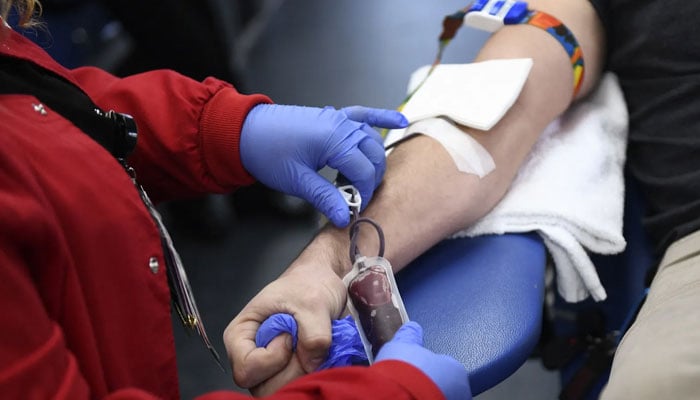Thalassemia on the rise in Pakistan
Islamabad: Unfortunately, there is a tremendous lack of awareness in a country like Pakistan about this chronic disease, which is on the increase day-by-day, said Director Sundas Foundation Air Vice Marshal (r) HI (M) Knighthood (Geneva) Aftab Hussain, while talking to ‘The News’. Immediate legislation should be done in National Assembly and Punjab Assembly for family screen test before marriage as being done in Sindh. Many countries in the world have eliminated this disease by enhanced awareness. In a thickly populated, resource constraint and financially worn-out country like Pakistan, it is extremely difficult to undertake family screening for Carrier Identification. People with thalassemia mutation only in one gene are known as known as Carriers or are said to have Thalassemia Minor.
Such people normally do not require blood transfusion or Iron Chelation Therapy. However, if both parents are Thalassemia Minor or Carriers, they can transmit their mutated/abnormal genes to baby who may become victim of Thalassemia Major. The baby (He or She) then requires regular blood transfusions to enhance their HB level. This frequency of blood transfusions increases with weight and age (4-5 times a month).Because of regular blood transfusions, extra amounts of iron start to accumulate in the body. When the body’s iron capacity is exceeded and the body cannot shed off it, iron builds up and starts to affect liver, hormonal organs and eventually the heart thus resulting in chronic iron overload.
Sundas Foundation Islamabad Thalassaemia Centre, located in F-9 Park Islamabad is rendering tremendous services free-of-cost since six years.
Pakistan is amongst highest thalassemia-burden country in the world with about 100,000 thalassemia major patients (unofficial figures) with ten to twelve thousand increase per annum. It has 12-14 M thalassemia minor (carriers) patients (5% of the population). The Director was of the view that Mass Screening of Carriers is neither cost-effective nor practical in a country like Pakistan that is thickly populated. As no baseline survey has ever been conducted, there are no credible statistics about thalassemia. The dilemma is that 99% of carriers do not know that they carry this disease as they don’t go through thalassemia test. The life expectancy of Thalassaemics used to be only 05 years in 1980s; however, with better treatment particularly in private sector, it has now enhanced to around 20 years. In Pakistan, public level facilities for thalassemia treatment are either non-existing or are totally insufficient.
There are well-known NGOs working in the private sector. However, these are available in large cities only whereas the disease is more pronounced in small towns and villages. The maximum cases are being diagnosed in High-Prevalence Areas i.e., Southern Punjab, KPK and AJK etc. where cousin/family marriages are more common. Lack of knowledge about disease and unawareness/unwilling thalassemia testing by patient families and public are major challenges. The remedial measures broadly include Accord priority (by the Govt.) to form up a Technical Advisory Cell in MoH for the data collection, treatment and prevention. Spread awareness on thalassaemia through National electronic and print media besides including a chapter on thalassaemia at metric/intermediate level. Pass legislation in all provincial and national assemblies for compulsory testing of thalassaemia before marriage. Ensure strict implementation by making the thalassaemia test certificate as pre-requisite of National ID Card. Undertake targeted screening of Index families for the identification of Thalassaemia Carriers.
-
 Royal Family Shares Princess Anne's Photos From Winter Olympics 2026
Royal Family Shares Princess Anne's Photos From Winter Olympics 2026 -
 Tori Spelling Feels 'completely Exhausted' Due To THIS Reason After Divorce
Tori Spelling Feels 'completely Exhausted' Due To THIS Reason After Divorce -
 SpaceX Successfully Launches Crew-12 Long-duration Mission To ISS
SpaceX Successfully Launches Crew-12 Long-duration Mission To ISS -
 PlayStation State Of Play February Showcase: Full List Of Announcements
PlayStation State Of Play February Showcase: Full List Of Announcements -
 Ed Sheeran, Coldplay Caught Up In Jeffrey Epstein Scandal
Ed Sheeran, Coldplay Caught Up In Jeffrey Epstein Scandal -
 Paul Anthony Kelly Reveals How He Nailed Voice Of JFK Jr.
Paul Anthony Kelly Reveals How He Nailed Voice Of JFK Jr. -
 US, China Held Anti-narcotics, Intelligence Meeting: State Media Reports
US, China Held Anti-narcotics, Intelligence Meeting: State Media Reports -
 Victoria, David Beckham React To Marc Anthony Defending Them Amid Brooklyn Drama
Victoria, David Beckham React To Marc Anthony Defending Them Amid Brooklyn Drama -
 Victoria Wood's Battle With Insecurities Exposed After Her Death
Victoria Wood's Battle With Insecurities Exposed After Her Death -
 Prince Harry Lands Meghan Markle In Fresh Trouble Amid 'emotional' Distance In Marriage
Prince Harry Lands Meghan Markle In Fresh Trouble Amid 'emotional' Distance In Marriage -
 Goldman Sachs’ Top Lawyer Resigns Over Epstein Connections
Goldman Sachs’ Top Lawyer Resigns Over Epstein Connections -
 How Kim Kardashian Made Her Psoriasis ‘almost’ Disappear
How Kim Kardashian Made Her Psoriasis ‘almost’ Disappear -
 Gemini AI: How Hackers Attempt To Extract And Replicate Model Capabilities With Prompts?
Gemini AI: How Hackers Attempt To Extract And Replicate Model Capabilities With Prompts? -
 Palace Reacts To Shocking Reports Of King Charles Funding Andrew’s £12m Settlement
Palace Reacts To Shocking Reports Of King Charles Funding Andrew’s £12m Settlement -
 Megan Fox 'horrified' After Ex-Machine Gun Kelly's 'risky Behavior' Comes To Light
Megan Fox 'horrified' After Ex-Machine Gun Kelly's 'risky Behavior' Comes To Light -
 Prince William's True Feelings For Sarah Ferguson Exposed Amid Epstein Scandal
Prince William's True Feelings For Sarah Ferguson Exposed Amid Epstein Scandal




